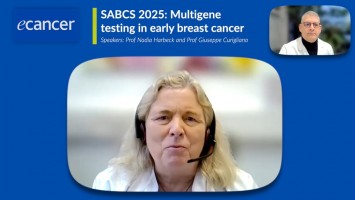IBCD 2016 - Innovation and biomarkers in cancer drug development
Standards in quality for genomic tests
Dr Christine Vietz - Foundation Medicine, Cambridge, USA
My presentation was really focussing on first just a very basic overview of why we do a comprehensive genomic profile and how we feel like that’s beneficial for patient care right now. Then the real focus was how we apply the regulatory requirements and the guidance around NGS and particularly NGS in the oncology space. So I like to tell people back at home at Foundation Medicine that we should be very much aligned with the regulators. We should care about the same things – we should care about making sure that we’re always returning the correct result to a patient because their care is absolutely depending on it. Most patients are going to be lucky to even have one comprehensive genomic profile done, so we’d better get it right. So there’s a lot on that.
So what I really wanted to do at this conference today was just go through some of the key things that we look at. So when we look at the guidance and it doesn’t tell you how to do anything, it tells you that you need to have assay controls in place but it doesn’t tell you what those controls ought to be exactly. So we have to figure out what they should be and we want to figure that out in a way that we’re not just ticking a box that we did something that the regulators told us to do but rather we’re doing something that’s really meaningful for our assay and for our own knowledge that we’re producing good results.
Could you tell us more about that process of self-evaluation?
I, several years ago, went through all the guidance and lined it up to try to determine what’s the same coming from, for example, CAP or New York State, whatever source, and taking their guidance and their requirements and putting it into language first of all that’s understandable and consistent. Then looking at either asking the question are we doing this or do we meet this guidance or this requirement and how are we doing that and is it the best way we could do it? Then if the question is, no, we’re not exactly doing this then the question is why not, are we doing something better? Is it not relevant? If the answer is it’s relevant and we’re not doing it then we need to put something in place.
Then, of course, we just routinely are watching for updates to guidance and regulations to make sure that we’re constantly on top of the most recent requirements.
What are your thoughts on the personalised medicine debate concerning affordability?
Clearly my point of view, coming from Foundation Medicine, is that it’s actually critical in this day and age, especially with targeted therapies, and there are so many targeted therapies coming on line right now, that the way to go about matching patients to targeted therapies is really through a comprehensive panel. So you’re running hopefully one test that’s going to give you an awful lot of information about all those different potential targeted therapies rather than taking a rather old-fashioned approach that we’re going to take a slice of tissue and send it off and look for this one biomarker and if it’s negative then we’ll come back and we’ll take another slice and keep repeating, which actually the individual assays themselves might cost less but when you add them all up it may not be beneficial. That doesn’t even get into the possibility that if a patient is put on a therapy that may not be effective that’s really costly or if a patient doesn’t get a therapy that they should get. In terms of cost, the costs with the technology right now, it is becoming something that’s much more affordable than it was a couple of years ago to do.
What sorts of discussions took place during the session you were in?
The one that seemed to have the most discussion was really around whether patients ought to get their data back, particularly when it’s data that’s part of research. There was a comment from the speaker that their experience was that their told them that they could not provide that research data to a patient because it was research, it wasn’t really there for clinical use. It’s a bit different from what many other people in the room had experienced, it’s a little different from our experience as well. There’s probably fairly good consensus that patients do have a right to their data but, that said, they need to be provided the data in a meaningful context. So if it’s data that’s generated as part of research and it’s not actually known how that data may impact clinical care, that needs to be really clear to them and they probably need to be receiving that data as a partnership with their physicians so that it’s being used appropriately and understood appropriately. But data that’s collected today maybe today there’s nothing available for them but maybe in a couple of years it could be really relevant.








